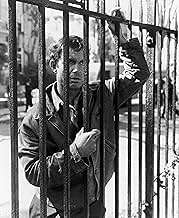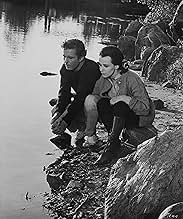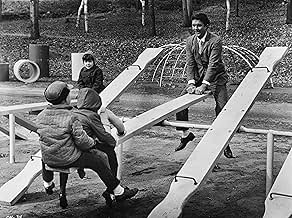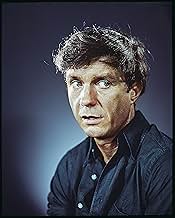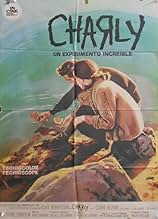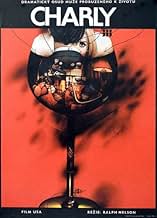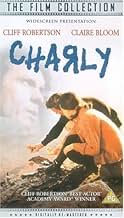IMDb-BEWERTUNG
6,9/10
7610
IHRE BEWERTUNG
Ein geistig behinderter Mann unterzieht sich einem Experiment, das ihm die Intelligenz eines Genies verleiht.Ein geistig behinderter Mann unterzieht sich einem Experiment, das ihm die Intelligenz eines Genies verleiht.Ein geistig behinderter Mann unterzieht sich einem Experiment, das ihm die Intelligenz eines Genies verleiht.
- Regie
- Drehbuch
- Hauptbesetzung
- 1 Oscar gewonnen
- 4 Gewinne & 6 Nominierungen insgesamt
Dick Van Patten
- Bert
- (as Richard Van Patten)
Edward McNally
- Gimpy
- (as Skipper McNally)
Marianna Case
- Young Woman
- (Nicht genannt)
Leon Collins
- Tap Dancer
- (Nicht genannt)
Harry Cooper
- Conference Attendee
- (Nicht genannt)
Frank Dolan
- Eddie
- (Nicht genannt)
Randee Lynne Jensen
- Extra
- (Nicht genannt)
Ralph Nelson
- Convention Speaker
- (Nicht genannt)
Donald Warnock
- Conference Attendee
- (Nicht genannt)
Empfohlene Bewertungen
Before there was "Awakenings" (1990) and "Good Will Hunting" (1997), there was a sincere, sad, and bittersweet film called "Charly" (1968). The film is based on the book "The Two Worlds of Charly Gordon." Cliff Robertson delivers a brilliant performance as a mentally retarded man who becomes a genius through scientific experiments. Claire Bloom is Charly's social worker (and love interest). The film is directed by Ralph Nelson ("Lillies of the Field"). score: 8 (out of 10).
10JDFeltz
I saw this movie at the drive-in when I was 12. I recall finding it to be a touching tragedy. I used to volunteer with "the special ed class", and found the students there to be gentle and grateful and affectionate, and could never understand how the other kids could make fun of them the way they did. But that only explains how and why this touched me personally, even at the age of 12.
Reviews some 30 years after this film was made are very critical, calling it 'schlock', and criticizing the simplification of a complex issue. However, over the last 30-40 years, society has become more enlightened about both mental retardation, but also about what science can and cannot do. It was easier to suspend belief and go with the concept.
At the time, this movie conveyed something new about how a mentally retarded person might view their situation....that alone made this film unique; lots of people never even considered the feelings of the mentally retarded, so this film surely opened some eyes.
And way ahead of it's time (I'm sure this was never considered in making the film), because it conveys the feelings and reactions of someone who is losing their intellectual capacity....such as those suffering from dementia or Alzheimer's. At that time, little thought was given by the average person about the feelings of either the mentally retarded, or people with Alzheimer's or dementia.
I'm sure the book was better than the movie; that almost always goes without saying. However, movies reach audiences that books sometimes don't, and this movie reached a new audience.
I'm afraid too many reviewers are unable to see an older movie and not hold it to the same standards, socially, scientifically and a cinematography standpoint. Cinema has evolved, as has society and science, and it's quite interesting to watch "Charly" with that in mind.
Reviews some 30 years after this film was made are very critical, calling it 'schlock', and criticizing the simplification of a complex issue. However, over the last 30-40 years, society has become more enlightened about both mental retardation, but also about what science can and cannot do. It was easier to suspend belief and go with the concept.
At the time, this movie conveyed something new about how a mentally retarded person might view their situation....that alone made this film unique; lots of people never even considered the feelings of the mentally retarded, so this film surely opened some eyes.
And way ahead of it's time (I'm sure this was never considered in making the film), because it conveys the feelings and reactions of someone who is losing their intellectual capacity....such as those suffering from dementia or Alzheimer's. At that time, little thought was given by the average person about the feelings of either the mentally retarded, or people with Alzheimer's or dementia.
I'm sure the book was better than the movie; that almost always goes without saying. However, movies reach audiences that books sometimes don't, and this movie reached a new audience.
I'm afraid too many reviewers are unable to see an older movie and not hold it to the same standards, socially, scientifically and a cinematography standpoint. Cinema has evolved, as has society and science, and it's quite interesting to watch "Charly" with that in mind.
After having done The Days Of Wine And Roses On the small screen and seeing Jack Lemmon get the part for the big screen, Cliff Robertson pulled a Katharine Hepburn. Like Kate the great who bought the screen rights to The Philadelphia Story and dictated the making of it to MGM, Robertson did the same for Charly which he had done on the US Steel Hour almost a decade earlier on television. He did better than Lemmon who only was nominated for Best Actor for Days Of Wine And Roses.
Charly is the story of an amiable mildly retarded man who works and supports himself in a job at a bakery, but also has agreed to become an experimental subject to scientists, Claire Bloom, Leon Janney, and Lilia Skala. Janney has a theory in which he feels that the proper enzyme given and an operation and Robertson could start to function like a normal person.
The operation has some foreseen and unforeseen consequences. One of them is that Robertson is one fully functioning male, but still lacks a whole lot of social skills. He forms an attachment to Bloom which is something she saw coming, but not necessarily her.
More important he becomes far more aware of the world around him and how badly treated he was by a lot of people. One role I very much liked was that of his landlady Ruth White who was a woman with a big heart who does value Robertson as a person and gives him the respect any of us is due.
Still the film belongs to Cliff Robertson who won an Oscar for Best Actor in 1968. Robertson had some stiff competition that year, but probably was helped by the fact that three of his competitors were British, Alan Bates for The Fixer, Ron Moody for Oliver, and Peter O'Toole for The Lion In Winter who if memory serves was the betting favorite. The other nominee was Alan Arkin for The Heart Is The Lonely Hunter. How he manages to go from a mildly retarded man to a person of no mean erudition is a wonderful process unfolding on the screen. Personally I think it ought to be required viewing in every acting class on the globe, the subtleties are something to behold.
I don't claim to be any kind of scientific expert on this or any other scientific matter, but I would love to hear from those who know more as to whether the whole theory is feasible or not. In any event though Charly is a fine picture with both a message and a heart.
Charly is the story of an amiable mildly retarded man who works and supports himself in a job at a bakery, but also has agreed to become an experimental subject to scientists, Claire Bloom, Leon Janney, and Lilia Skala. Janney has a theory in which he feels that the proper enzyme given and an operation and Robertson could start to function like a normal person.
The operation has some foreseen and unforeseen consequences. One of them is that Robertson is one fully functioning male, but still lacks a whole lot of social skills. He forms an attachment to Bloom which is something she saw coming, but not necessarily her.
More important he becomes far more aware of the world around him and how badly treated he was by a lot of people. One role I very much liked was that of his landlady Ruth White who was a woman with a big heart who does value Robertson as a person and gives him the respect any of us is due.
Still the film belongs to Cliff Robertson who won an Oscar for Best Actor in 1968. Robertson had some stiff competition that year, but probably was helped by the fact that three of his competitors were British, Alan Bates for The Fixer, Ron Moody for Oliver, and Peter O'Toole for The Lion In Winter who if memory serves was the betting favorite. The other nominee was Alan Arkin for The Heart Is The Lonely Hunter. How he manages to go from a mildly retarded man to a person of no mean erudition is a wonderful process unfolding on the screen. Personally I think it ought to be required viewing in every acting class on the globe, the subtleties are something to behold.
I don't claim to be any kind of scientific expert on this or any other scientific matter, but I would love to hear from those who know more as to whether the whole theory is feasible or not. In any event though Charly is a fine picture with both a message and a heart.
10desbyrne
I saw this movie on TV when I was a child and while I don't remember every single plot detail, overall it made a lasting impression on me. So much so that I have been determined all these years to try and see this movie again.
I stumbled across the movie on TV and I clearly remember the highly emotional impact it made on me.
Thanks to IMDb I was able to keep searching for the title as I could best remember it and was thrilled when I discovered it here.
A truly stunning memorable movie - I only wish I could get it on DVD. Highly recommended.
When I think of all the dross I have watched over the years that is so forgettable, it is wonderful to return and discover a movie that captivate me so long ago and discover that I am not alone in rating it 10 out of 10!
I stumbled across the movie on TV and I clearly remember the highly emotional impact it made on me.
Thanks to IMDb I was able to keep searching for the title as I could best remember it and was thrilled when I discovered it here.
A truly stunning memorable movie - I only wish I could get it on DVD. Highly recommended.
When I think of all the dross I have watched over the years that is so forgettable, it is wonderful to return and discover a movie that captivate me so long ago and discover that I am not alone in rating it 10 out of 10!
A mentally challenged man named Charly (Cliff Robertson) desires to become smarter so that he wouldn't always be picked on by his so-called friends at his workplace. However, he has made no progress despite his efforts of going to school. One day he gets a chance to undergo some experimental brain surgery and his intelligence skyrockets, making him a genius. Still, he cannot stop feeling like an outsider or find happiness with Alice, the woman he loves (Claire Bloom).
The director uses many split screens and other alienating techniques to portray the fragile mental state of Charly; at points they get rather annoying and look dated. The montage near the end, depicting the progression of Charly and Alice's relationship, comes across as rather hasty, considering the scene directly preceding it. Mostly the story advances fine though, and the pondering about the surgery's effects on Charly's psyche is interesting – there should have been more of it, actually. Robertson's Oscar-winning performance in the lead role is decent, although I preferred his calm 'intelligent Charly' to his naïve 'challenged Charly'.
The director uses many split screens and other alienating techniques to portray the fragile mental state of Charly; at points they get rather annoying and look dated. The montage near the end, depicting the progression of Charly and Alice's relationship, comes across as rather hasty, considering the scene directly preceding it. Mostly the story advances fine though, and the pondering about the surgery's effects on Charly's psyche is interesting – there should have been more of it, actually. Robertson's Oscar-winning performance in the lead role is decent, although I preferred his calm 'intelligent Charly' to his naïve 'challenged Charly'.
Wusstest du schon
- WissenswertesAfter the operation, when Charly loses his temper over being beaten once again by the mouse, no one seems to notice that he is now pronouncing Algernon's name with the first N included, instead of his previous "Algeron" with the missing N.
- PatzerWhen Charly is talking to Mrs. Kinnian outside the building for his night class, he's wearing a gold vest. When the camera cuts back to him after Mrs. Kinnian enters her car, he's wearing a blue vest.
- Zitate
Charly Gordon: I was wondering why the people who would never dream of laughing at a blind or a crippled man would laugh at a moron?
- Crazy CreditsThe title appears onscreen as if scrawled by a child, with the "R" backwards.
- VerbindungenFeatured in The 70th Annual Academy Awards (1998)
Top-Auswahl
Melde dich zum Bewerten an und greife auf die Watchlist für personalisierte Empfehlungen zu.
Details
- Erscheinungsdatum
- Herkunftsland
- Sprache
- Auch bekannt als
- The Two Worlds of Charly Gordon
- Drehorte
- Produktionsfirmen
- Weitere beteiligte Unternehmen bei IMDbPro anzeigen
Box Office
- Bruttoertrag in den USA und Kanada
- 15.826.800 $
- Weltweiter Bruttoertrag
- 18.530.000 $
Zu dieser Seite beitragen
Bearbeitung vorschlagen oder fehlenden Inhalt hinzufügen

